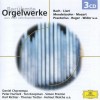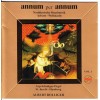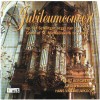Composers
Vincent Lübeck (c. September 1654 – 9 February 1740) was a German composer and organist. He was born in Padingbüttel and worked as organist and composer at Stade's St. Cosmae et Damiani (1675–1702) and Hamburg's famous St. Nikolai (1702–1740), where he played one of the largest contemporary organs. He enjoyed a remarkably high reputation in his lifetime, and had numerous pupils, among which were two of his sons.
Despite Lübeck's longevity and fame, very few compositions by him survive: a handful of organ praeludia and chorales in the North German style, a few cantatas and several pieces for harpsichord, some of which were published during the composer's lifetime. Of his works, the organ pieces are the most important: influenced by Dieterich Buxtehude and Johann Adam Reincken, Lübeck composed technically and artistically sophisticated works, with frequent virtuosic passages for pedal, five-voice polyphony, and other devices rarely used by most of the composers of the period.
Lübeck was born in Padingbüttel, a small town situated some 70 km north of Bremen. His father (also named Vincent) worked as organist first at Glückstadt and then, from 1647, at the Marienkirche in Flensburg, where he was succeeded in 1654 by Caspar Förckelrath. Lübeck's father died that year, and Förckelrath married the widow; it follows that he must have been young Lübeck's first teacher. According to scholar Wolfram Syré, Lübeck may have also studied under Andreas Kneller, whose influence is palpable in Lübeck's surviving keyboard works. In late 1675 Lübeck became organist of St. Cosmae et Damiani in Stade. The city had been a prominent member of the Hanseatic League, but by 1675 it was being slowly eclipsed by nearby Hamburg. Nevertheless, St. Cosmae had an organ built by the celebrated Arp Schnitger (which still survives, although it has been reconstructed). Upon accepting the post, Lübeck married, as was custom in some parts of North Germany, the daughter of his predecessor, one Susanne Becker.
The only dated works by Lübeck are two cantatas composed in Stade in November 1693, both commissioned by the Swedish administration in Stade in memory of Ulrike Eleonora of Denmark. Aside from these pieces, we know very little about the composer's activities at Stade. His reputation as organist, organ consultant and teacher grew steadily, and finally landed him the position at St. Nikolai in Hamburg in 1702; he was succeeded in Stade by his son, Peter Paul (1680–1732). Hamburg was already one of the largest cities in Germany and had a long organ tradition associated first with pupils of Jan Pieterszoon Sweelinck: Heinrich Scheidemann, Jacob Praetorius, and others. A number of other important composers worked in Hamburg in the late 17th century: among them Matthias Weckmann, who helped organize the concert life of the city, and Johann Adam Reincken, one of the most celebrated organists of his time. However, by the time of Lübeck's arrival, only Reincken was still alive, and the musical life of the city, as well as its economic position, was in a slow decline. In 1720 Johann Sebastian Bach applied for a post at the Jacobikirche, but withdrew the application after acquainting himself with the local circumstances.
Nevertheless, Lübeck's position in Hamburg was a prominent one. St. Nikolai was one of the city's most important churches, and the organ was not only another Schnitger but also one of the largest organs in the world: a four-manual instrument with 67 stops. Johann Mattheson, writing in 1721, named both the organ and the organist "extraordinary", alluding to Lübeck's apparently great fame: "But how to extol someone who is already greatly renowned? I need only give his name, Vincent Lübeck." Unfortunately, Lübeck's St. Nikolai did not survive into the 20th century: the church was destroyed during the Great Fire of 1842.
Lübeck remained organist of St. Nikolai until his death in 1740. One of his sons (also named Vincent, 1684–1755) assisted him from 1735 and succeeded him. During much of his career, Lübeck was a renowned teacher and organ consultant (passing judgements on, among others, Schnitger instruments). But we know little about his teaching activities; his pupils, aside from the two sons, included Michael Johann Friedrich Wiedeburg, a renowned keyboard pedagogue. Although J.S. Bach may have been influenced by Lübeck, they almost certainly never met. Lübeck's works were quickly forgotten with much of the rest of 17th and 18th century organ music. The first modern edition of the composer's work appeared in 1921 in Germany (G. Harms (Klecken, 1921)). A school in Stade was named in his honor, the Vincent Lübeck Gymnasium.
Recently Added
Biography
Vincent Lübeck (c. September 1654 – 9 February 1740) was a German composer and organist. He was born in Padingbüttel and worked as organist and composer at Stade's St. Cosmae et Damiani (1675–1702) and Hamburg's famous St. Nikolai (1702–1740), where he played one of the largest contemporary organs. He enjoyed a remarkably high reputation in his lifetime, and had numerous pupils, among which were two of his sons.
Despite Lübeck's longevity and fame, very few compositions by him survive: a handful of organ praeludia and chorales in the North German style, a few cantatas and several pieces for harpsichord, some of which were published during the composer's lifetime. Of his works, the organ pieces are the most important: influenced by Dieterich Buxtehude and Johann Adam Reincken, Lübeck composed technically and artistically sophisticated works, with frequent virtuosic passages for pedal, five-voice polyphony, and other devices rarely used by most of the composers of the period.
Lübeck was born in Padingbüttel, a small town situated some 70 km north of Bremen. His father (also named Vincent) worked as organist first at Glückstadt and then, from 1647, at the Marienkirche in Flensburg, where he was succeeded in 1654 by Caspar Förckelrath. Lübeck's father died that year, and Förckelrath married the widow; it follows that he must have been young Lübeck's first teacher. According to scholar Wolfram Syré, Lübeck may have also studied under Andreas Kneller, whose influence is palpable in Lübeck's surviving keyboard works. In late 1675 Lübeck became organist of St. Cosmae et Damiani in Stade. The city had been a prominent member of the Hanseatic League, but by 1675 it was being slowly eclipsed by nearby Hamburg. Nevertheless, St. Cosmae had an organ built by the celebrated Arp Schnitger (which still survives, although it has been reconstructed). Upon accepting the post, Lübeck married, as was custom in some parts of North Germany, the daughter of his predecessor, one Susanne Becker.
The only dated works by Lübeck are two cantatas composed in Stade in November 1693, both commissioned by the Swedish administration in Stade in memory of Ulrike Eleonora of Denmark. Aside from these pieces, we know very little about the composer's activities at Stade. His reputation as organist, organ consultant and teacher grew steadily, and finally landed him the position at St. Nikolai in Hamburg in 1702; he was succeeded in Stade by his son, Peter Paul (1680–1732). Hamburg was already one of the largest cities in Germany and had a long organ tradition associated first with pupils of Jan Pieterszoon Sweelinck: Heinrich Scheidemann, Jacob Praetorius, and others. A number of other important composers worked in Hamburg in the late 17th century: among them Matthias Weckmann, who helped organize the concert life of the city, and Johann Adam Reincken, one of the most celebrated organists of his time. However, by the time of Lübeck's arrival, only Reincken was still alive, and the musical life of the city, as well as its economic position, was in a slow decline. In 1720 Johann Sebastian Bach applied for a post at the Jacobikirche, but withdrew the application after acquainting himself with the local circumstances.
Nevertheless, Lübeck's position in Hamburg was a prominent one. St. Nikolai was one of the city's most important churches, and the organ was not only another Schnitger but also one of the largest organs in the world: a four-manual instrument with 67 stops. Johann Mattheson, writing in 1721, named both the organ and the organist "extraordinary", alluding to Lübeck's apparently great fame: "But how to extol someone who is already greatly renowned? I need only give his name, Vincent Lübeck." Unfortunately, Lübeck's St. Nikolai did not survive into the 20th century: the church was destroyed during the Great Fire of 1842.
Lübeck remained organist of St. Nikolai until his death in 1740. One of his sons (also named Vincent, 1684–1755) assisted him from 1735 and succeeded him. During much of his career, Lübeck was a renowned teacher and organ consultant (passing judgements on, among others, Schnitger instruments). But we know little about his teaching activities; his pupils, aside from the two sons, included Michael Johann Friedrich Wiedeburg, a renowned keyboard pedagogue. Although J.S. Bach may have been influenced by Lübeck, they almost certainly never met. Lübeck's works were quickly forgotten with much of the rest of 17th and 18th century organ music. The first modern edition of the composer's work appeared in 1921 in Germany (G. Harms (Klecken, 1921)). A school in Stade was named in his honor, the Vincent Lübeck Gymnasium.
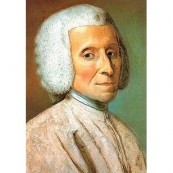
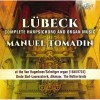
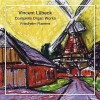
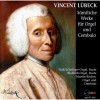
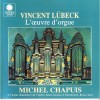


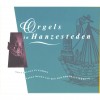
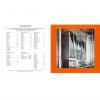
![Great European Organs. 12-John Scott Whiteley [St Bavo Haarlem]](http://static.classicalm.com/repository/collection-cover/small/863-img1340965531370432.jpg)
